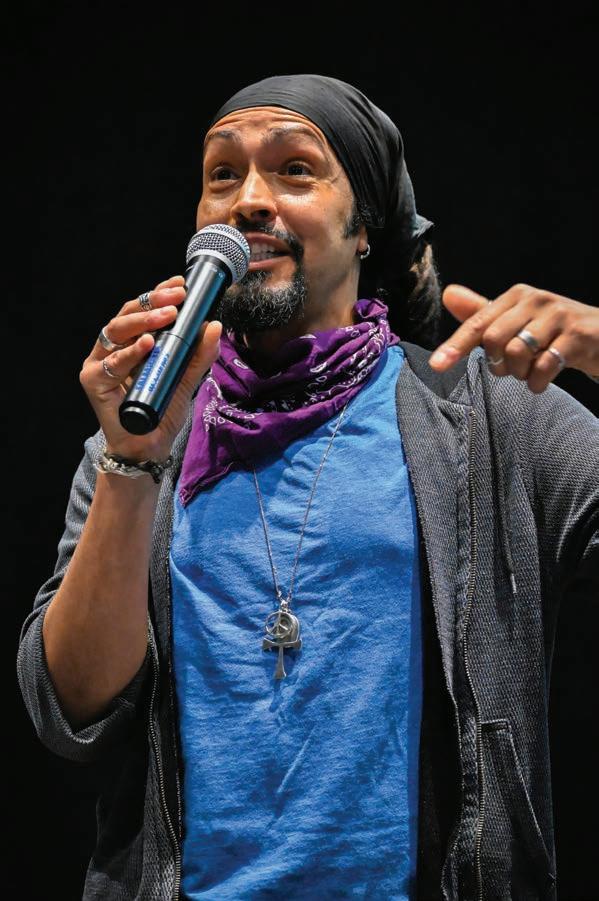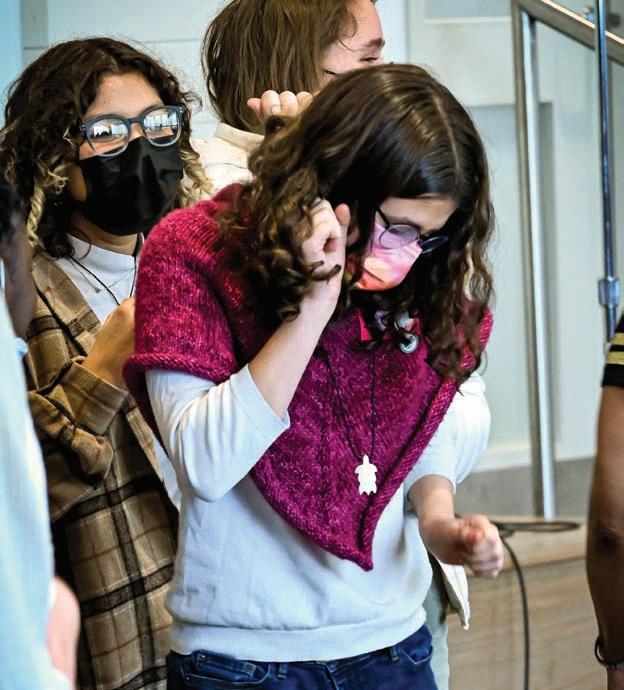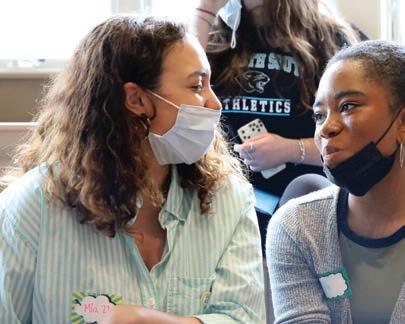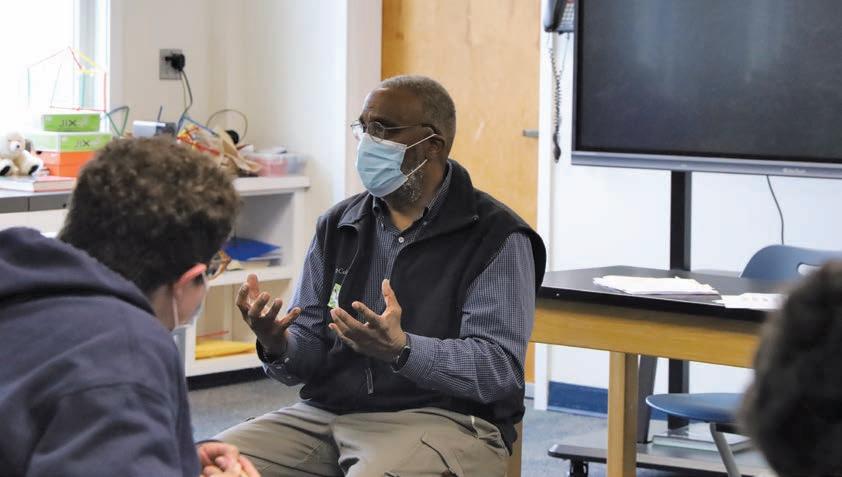
6 minute read
Centerpiece
STUDENTS FOR SOCIAL & ENVIRONMENTAL JUSTICE JOINING TOGETHER: SPARKING CHANGE
“There is power in bringing the community together,” said senior Mia Galvam, co-founding member of Falmouth Academy’s Students for Social Justice (SSJ). This was the reason she gave for why this group wanted to take on the herculean task of hosting a regional social and environmental justice conference for youth from all over SE Massachusetts. “We wanted to foster excitement, collaboration, and a deeper understanding of the issues in order to motivate young people to get involved in their home communities,” Galvam explained.
And, on March 26, 2022, they did just that as they launched SSJ’s inaugural conference.



The conference theme, Joining Together: Sparking Change, reflected a desire to bring students and educators together to share, learn, and inspire one another to create positive contributions to social and climate justice efforts, said Carol DiFalco, Falmouth Academy’s school counselor and DEI coordinator. Content areas were identified that would resonate with students—from the curious to the committed—and then area experts were sought who could bring the content to life in energizing ways. The community response was overwhelmingly positive and the list of facilitators included educators, scientists, selectpersons, small business owners, journalists, DEI coordinators, museum curators, and more. “By approaching these issues in several different ways, we hoped to attract as many types of students as possible,” said Galvam. “We worked hard to create opportunities where students could choose to enter the conversation in ways that felt comfortable to them, whether through activism, wellness, journalism, policy, or politics, around issues such as race, gender equality, or climate change.”
Falmouth Academy recently completed a strategic planning initiative designed to chart the course of the school over the next three to five years. In addition to operationalizing its commitment to social justice, the plan states that the school will make a meaningful difference through initiatives that integrate sustainability, and that speak to the unique challenges of an increasingly uncertain and unstable climate. Student leader Tarun Gonneea ’22 noted the impact of this instability on his generation when he explained one reason why he wanted to be part of this conference. “What we are going into is unprecedented, and we have to, unfortunately, mature a little faster, and take responsibility a little sooner.”
He went on to explain that social and environmental justice issues are demonstrably linked in that the effects of climate change impact minority populations and black and brown communities at a disproportionate rate. “It would be inauthentic not to discuss them together under the broad umbrella of social justice,” he said. DiFalco noted the importance of having Black, Indigenous, People of Color (BIPOC) representation when choosing facilitators and workshop topics, “One of the responsibilities of doing this work is to elevate voices of disproportionately impacted populations, who can amplify those voices at this event.”
The day-long event was at capacity with 140 students from 14 schools, and over 40 facilitators and volunteers, who traveled by car, bus, and boat to attend. It kicked off with a keynote address by storyteller Derrick Lugo (pictured next page, top left) who charmed the audience with anecdotes about life on the Appalachian Trail. A self-described New York City urbanite who never hiked or camped a day in his life, Lugo set off with minimal planning for the six-month trek from Georgia to Maine. Despite not knowing how to pitch a tent or filter water, Lugo, christened with the trail name Mr. Fabulous, completed the 2,200-mile hike. His story, which he chronicles in his book, The Unlikely Thru-Hiker, wasn’t just about blind determination or dumb luck. It was about trying something new, maybe even a bit scary, and not being afraid to fail—believing in oneself and the goodness



of others, cherishing the beauty of nature and the fragility of life, and understanding that even in the most remote places, we are never truly alone.
Uplifted by Lugo’s words, conference-goers then went their separate ways. Students attended three 45-minute sessions of their choosing while teachers and chaperones engaged in conversations and presentations tailored to them, such as a discussion on the experiences of gender-queer students facilitated by Yaz Aubrey and Lila Journalist, ninth graders at Falmouth Academy. Midday, there was a catered lunch and a special performance by The ZYG808, a Grammy-nominated music-making soul poet who sang and rapped until the students got up to groove with him, turning Morse Hall into a dance hall.
The day came to a close with a celebratory plenary session featuring members of the Ho-Chunk and Wampanoag Nations led by Cameron Greendeer, Native Youth Community Projects manager for the Mashpee Wampanoag tribe and member of the Ho-Chunk Nation. The tribal members performed several kinds of ceremonial dances wearing traditional regalia while Greendeer generously explained the significance and sacredness of each. When asked what she hoped students would have gotten out of the conference, DiFalco said, “It was our hope that students would leave rejuvenated and ready to work— with some extra tools in their pockets, a greater knowledge of community resources, and support from a network of student and adult collaborators committed to this work.”
Workshops
Bias and Blindspots in Journalism: A Crash Course
Calli Remillard, Journalist, Falmouth Enterprise
Cape Verde's Response to Climate Change
Barbara Burgo, Cape Verdean Museum
Climate Solutions A-Z: What You Can Do!
Britta Santamauro, Librarian, Falmouth Academy
Declare Yourself: A Poetry Workshop
Marney Rathbun ’12, English Teacher, Falmouth Academy
Economic and Ethical Implications of The United States‘ Practices with Globally Displaced Populations
Luke Xiang '23, Student, Falmouth Academy Carol DiFalco, DEI Coordinator and School Counselor, Falmouth Academy
Whose Memory is it Anyway? The Roles of Monuments and Statues in Racial Bias
Rae Nishi, Ph.D., Senior Research and Education Scholar
Public Policy to Spark Change
Megan English Braga, Falmouth Selectboard Onjalé Scott Price, Falmouth Selectboard Amy Galvam, Communications Director, Falmouth Academy Jacquelyn Hartman, JEDI consultant (justice, equity, diversity, and inclusion)
For Whom is Shakespeare Designed?
Steve Rowland, Documentary Producer Amiti Bey, Co-Director of “Time Out of Joint”
Share Your Story
Derick Lugo, Author, Keynote Speaker
What's Cooking? Using Sunlight to Prepare Food
Petra Ehrenbrink, Academic Dean, Falmouth Academy
Unite People and Ignite Change with the Power of an Image!
Susan Moffat, Photography teacher, Falmouth Academy
THRIVE & CIGSYA
Tara Vargas Wallace, Amplify Cape Cod and Thrive Scott Fitzmaurice, Cape & Islands Gay & Straight Youth Alliance
Videography and Social Justice
Talia Landry, Communications Coordinator, Mashpee Wampanoag Tribe
What is Cultural Justice?
Paula Peters, SmokeSygnals
Windows & Mirrors: Navigating Diversity and Representation in Contemporary Publishing for Children and Teens
Sara Hines, Eight Cousins Bookstore
Global Mobilization Game: Mobilizing Economies to Create a Sustainable and Just World
Greg Watson, Schumacher Center for a New Economics










Social Justice Leadership Team
Daniela Carvajal ’24, Mia Galvam ’22, Tarun Gonneea ’22, Abigail Neubert ’22, Thalia O’Neil ’24, Sarah Thieler ’22, Sabrina Vazquez ’24
Faculty Advisors
Matt Barnes, Carol DiFalco, Liz Klein
SSJ Members
David Aubrey ’26, Yaz Aubrey ’25, Lili Connors ’24, Evan Freedman ’24, Charlotte Galvam ’27, Taleena Gonneea ’26, Bianca Greco ’23, Fiona Gully ’24, Sophie Holmes ’27, Lila Journalist ’25, Declan Lane ’25, Noah Manning ’24, Natalie Packard ’24, Robert Ronan ’26, Lexi Todd-Weinstein ’27, and Tianxing (Luke) Xiang ’23






